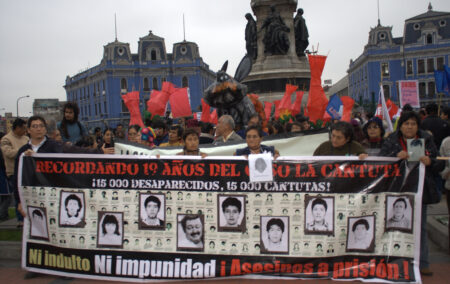Alberto Fujimori, the former Peruvian president whose 1990s-era government crushed Maoist rebels and revived a battered economy but descended into authoritarianism and corruption before collapsing, has died at 86, the Wall Street Journal reports.
Fujimori, a little-known academic, came to power during one of the most tumultuous periods in Peru’s history. His supporters credit him with bringing peace and economic prosperity to a chaotic, violent country, but he was later jailed for human rights crimes and corruption.
Fujimori entered politics in 1990, running against author Mario Vargas Llosa. Fujimori won because voters distrusted Peru’s traditional elite and opposed Vargas Llosa’s proposed austerity measures.
Fujimori implemented many of Vargas Llosa’s policies. He removed state controls, privatised state-owned companies, replaced Peru’s hyperinflation-ravaged currency and rewrote the constitution to attract foreign capital. Economists say this laid the foundation for Peru’s robust economic growth during the past two decades.
He also confronted the Maoist Shining Path insurgency. The 1992 capture of Abimael Guzmán, the group’s messianic leader, crippled the group.
In 1992, he suspended the constitution, purged the judiciary and closed the Peruvian Congress.
In the early 1990s Fujimori was convicted of ordering the extrajudicial killings of 25 people. A paramilitary death squad, Grupo Colina, had been set up to target suspected rebel supporters and leftist activists.
In what later came to be called the La Cantuta massacre, supposed members of Shining Path, including a university professor and nine students from Lima’s La Cantuta University, were abducted, tortured, and killed by Grupo Colina. The incident occurred two days after the Shining Path’s Tarata bombing, which killed over 40 people in Lima Province.
The massacre was one of the crimes cited in Fujimori’s later conviction for human rights abuses.
In 1996, in his second term, the Tupac Amaru Revolutionary Movement stormed the Japanese Embassy in Lima and took foreign diplomats hostage. Four months later, commandos stormed the compound through an underground tunnel they built into the compound, killed the rebels and freed most of the hostages.
Fujimori ran for a third term in 2000, but the Organisation of American States and human-rights groups accused him of rigging the vote count and intimidating opposition candidates.
In 2000, his spymaster was exposed for bribing opposition lawmakers, judges and media owners to buy their support for Fujimori.
Fujimori’s government collapsed after he fled to Japan and submitted his resignation by fax.
Investigators estimated that administration officials had embezzled about $600 million.
Fujimori’s Japanese citizenship protected him from extradition, but in 2005, Fujimori flew to Chile en route to Peru. He was detained and extradited.
In 2009 Fujimori was convicted and sentenced to 25 years in prison for human-rights violations and corruption: the first time a democratically elected president in Latin America was convicted in his own country of human rights crimes.
In 2015, Fujimori was found guilty of siphoning off millions of dollars from the Armed Forces in the 1990s.
In 2017 President Pedro Pablo Kuczynski granted him a humanitarian pardon at Christmas 2017, due to Fujimori’s deteriorating health. National protests accused Kuczynski of making a backroom deal with Fujimori’s supporters to avoid impeachment.
The Supreme Court overturned the pardon and Fujimori went back to prison in January 2019, but was released in December 2023 after Peru’s top court reinstated his 2017 pardon.
[Image: Relatives of the La Cantuta victims say no to a possible pardon for Fujimori, https://www.flickr.com/photos/advocacy_project/5949664640]


